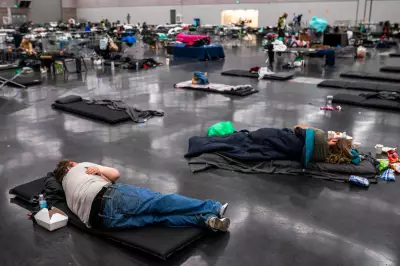
The genteel suburbs of Tigard, Oregon, once a quiet refuge from the bustle of nearby Portland, are now on the front line of a escalating humanitarian and public safety crisis. A massive influx of homeless individuals and sprawling encampments is transforming parks, greenways, and residential areas, leaving locals frightened and angry.
Residents report a dramatic deterioration in their quality of life, citing open drug use, rampant theft, and a pervasive sense of lawlessness. The situation has become so dire that many now avoid public spaces they once enjoyed.
'It's a Nightmare': Residents Speak Out
'We don't feel safe anymore,' one long-time resident told us, echoing the sentiments of many. 'We've had our cars broken into, our sheds rifled through. The noise and the mess are constant. It's a nightmare.'
The visual blight is undeniable. Makeshift shelters constructed from tarps and debris line pathways. The accumulation of rubbish, human waste, and abandoned possessions has created a severe sanitation hazard, with concerns about disease and environmental contamination growing by the day.
A Political Football with No Easy Answers
The crisis has ignited a fierce political debate. Critics point the finger directly at Portland's permissive policies, arguing that the city's approach has effectively exported its problem to neighbouring suburbs without providing adequate solutions or resources.
Local officials in Tigard are caught in the crossfire, facing immense pressure from constituents to 'clean up' the camps while navigating complex legal rulings that limit how and when they can intervene. The balancing act between compassion for a vulnerable population and the duty to protect public safety has never been more difficult.
Searching for a Solution
With tensions rising and resources stretched thin, the community is desperately searching for a path forward. Calls for increased police patrols clash with demands for more permanent supportive housing and mental health services.
What is clear is that the situation in Tigard is a microcosm of a much larger crisis gripping the entire West Coast. Without a coordinated, well-funded regional strategy, residents fear their suburb may be permanently altered, a casualty in a war against homelessness that currently has no end in sight.





